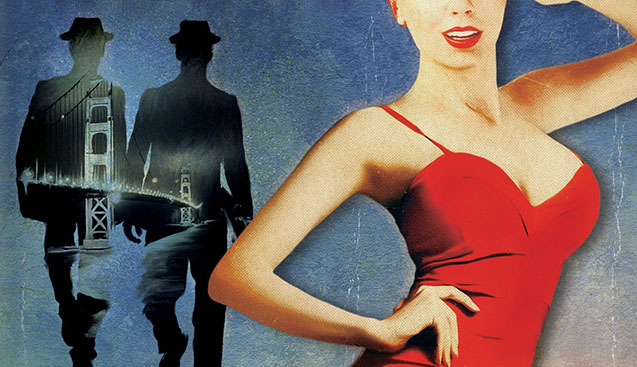Christopher Moore Goes Noir in His Latest Smart Genre Satire
 My first exposure to Christopher Moore was his supremely absurd 2002 novel Lamb: The Gospel According to Biff, Christ’s Childhood Pal. Just reading that wonderfully daring title, I knew this guy was different. And I liked the words inside, too—quite a lot. A subsequent perusal of his backlist, and the devouring of everything he’s written since, has taught me the bizarro mindset that title promises is Christopher Moore’s most welcome stock-in-trade.
My first exposure to Christopher Moore was his supremely absurd 2002 novel Lamb: The Gospel According to Biff, Christ’s Childhood Pal. Just reading that wonderfully daring title, I knew this guy was different. And I liked the words inside, too—quite a lot. A subsequent perusal of his backlist, and the devouring of everything he’s written since, has taught me the bizarro mindset that title promises is Christopher Moore’s most welcome stock-in-trade.
Noir (B&N Exclusive Signed Book)
Noir (B&N Exclusive Signed Book)
Hardcover $27.99
It pleases me to state that the ensuing 16 years have not softened his crazy side. If anything, his latest novel Noir only shows a strengthened propensity for snappy dialogue, perverse scenarios, sharp satire, and oddball characters. This time, the target is classic hardboiled crime novels. and the setting is 1947 San Francisco, a city reeling in a post-World War II haze, populated with a volatile mixture of diverse cultures, neighborhoods, and interests. It’s a combustible tinderbox, seething with shifty criminal elements, illegal activities, racial tension, and a whole slew of weird-beard characters.
It pleases me to state that the ensuing 16 years have not softened his crazy side. If anything, his latest novel Noir only shows a strengthened propensity for snappy dialogue, perverse scenarios, sharp satire, and oddball characters. This time, the target is classic hardboiled crime novels. and the setting is 1947 San Francisco, a city reeling in a post-World War II haze, populated with a volatile mixture of diverse cultures, neighborhoods, and interests. It’s a combustible tinderbox, seething with shifty criminal elements, illegal activities, racial tension, and a whole slew of weird-beard characters.
Our hero (or what passes for one) is bartender Sammy Tiffin, a hard-drinking hack at a low end dive called Sal’s Saloon. When a gorgeous dame (this is 1947 after all) named Stilton (yes, like the cheese) wanders in and takes a seat at the bar, Sammy is hopelessly smitten. In a perfect world what follows would be their boozy, unorthodox courtship in a city full of crime and danger. But this is Christopher Moore, so anything resembling normalcy is more or less out the window.
As it happens, Sammy’s boss has recruited him to procure a gaggle of “women of easy virtue” to be sent with an Air Force general to the a secret spot known as Bohemian Grove, where high-powered men get their high-powered freak on beneath the shadow of gigantic owl statue. Before long, things spiral out of control, with Sammy caught up in the middle of things, including a rogue black mamba on a killing spree, a couple of dangerous government agents, strange Chinatown dining experiences, and definitive proof we are not alone in the universe.
Into this heady brew, Moore mixes key plot points drawn from actual history—specifically, a UFO sighting near Mount Rainier, news of a mysterious incident in Roswell, New Mexico, rumors of a crashed alien saucer, and the aforementioned Bohemian Grove, where the powerful elite of the world really do meet meet to get weird—assuming my understanding of the associated conspiracy theories is correct.
Lamb: The Gospel According to Biff, Christ's Childhood Pal
Lamb: The Gospel According to Biff, Christ's Childhood Pal
In Stock Online
Paperback $19.99
These surreal, shady happenings are delivered alongside steady helpings of the pun-laden prose, sick sight gags, and wicked, occasionally raunchy humor that readers have come to expect from one of America’s funniest living writers.
These surreal, shady happenings are delivered alongside steady helpings of the pun-laden prose, sick sight gags, and wicked, occasionally raunchy humor that readers have come to expect from one of America’s funniest living writers.
This is not a sugar-coated 1947. The ugly parts are all on display, with Moore’s diverse cast of characters all experiencing some degree of injustice. The clipped, Raymond Chandler-esque dialogue and descriptions you’d expect from a pulp novel of the era are omnipresent; similarly, Moore is not shy about recognizing the regrettable racial/culture/gender inequalities beneath the period’s slick sheen of style. (Fittingly, he begins with an author’s note: “The language and attitudes of the narrators and characters regarding race, culture, and gender are contemporary to that time and may be disturbing to some.”)
There’s a dark edge to the book, yes, but Moore’s players are (mostly) able to suffer the brutal onslaught and emerge more or less unscathed, if not a little stranger. It’s tough to not root for these quirky underdogs, and the sleazy, booze-soaked, bleary-eyed decadence they must endure has a strange allure of its own. Who knows what evil lurks at the bottom of an ice machine? Christopher Moore knows.
Noir is available April 17 in an exclusive signed edition from Barnes & Noble.

